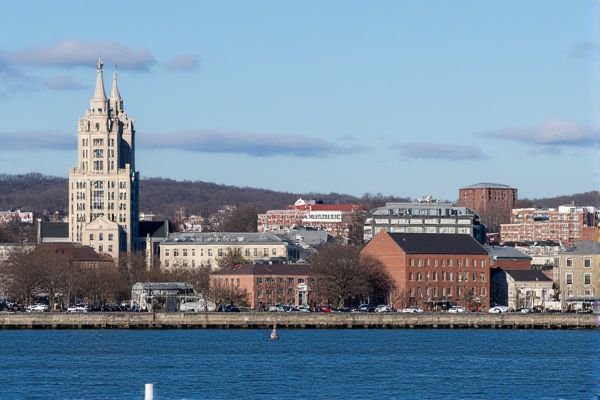
Internet and telecommunications options in Rhode Island: Major internet providers in Rhode Island. Availability of fiber optic services. Average internet speeds by region. Mobile carrier coverage maps. Competitive pricing for internet plans. Rural internet accessibility options. Options for satellite internet services. Local internet service reviews. Government broadband initiatives. Wi-Fi hotspots and community access points.
Major internet providers in Rhode Island
When considering the major internet providers in Rhode Island, residents have several options to choose from. Notably, Verizon Fios stands out for its 100% fiber-optic internet, offering both fast upload and download speeds. Cox is another strong contender, providing widespread coverage alongside competitive pricing. Additionally, local provider i3 Broadband is available, albeit with limited coverage. For those interested in alternative options, T-Mobile Home Internet and Verizon 5G Home Internet are available, while satellite providers such as HughesNet and Viasat are also present, though they often face challenges with slower speeds and data limitations.
Availability of fiber optic services
More than 75% of Rhode Island households have access to fiber-optic internet, with Verizon Fios being the largest fiber ISP in the state, covering approximately 83.35% of the area. For a comprehensive analysis of the best options available, you can explore the detailed review of the top service providers on CNET. This widespread access ensures residents can enjoy a fast and reliable online experience, making fiber-optic a popular choice for many in the region.
Average internet speeds by region
In Rhode Island, average internet speeds vary by region, but many cities such as Providence, Warwick, and Cranston boast download speeds of up to 1000 Mbps, and upload speeds ranging from 880 Mbps to 1000 Mbps, achieving complete internet coverage in these areas. The top cities for internet speeds include Johnston, Cumberland, and Cranston, with average download speeds ranging from 268.46 Mbps to over 294.31 Mbps, and average upload speeds reaching up to 102.48 Mbps. With 100% access to high-speed and fiber internet, these locations ensure robust connectivity. For comprehensive details on internet availability and speeds across Rhode Island, check out the HighSpeedInternet site.
Mobile carrier coverage maps
In Rhode Island, T-Mobile emerges as the leader in 5G coverage, boasting robust connectivity with no significant gaps, while AT&T and Verizon exhibit some small gaps in their 5G coverage. Despite these differences in next-generation service, all three carriers maintain nearly perfect 4G LTE coverage across the state. For more detailed insights into coverage and connectivity, you can explore the comprehensive analysis provided by the FCC Maps. This level of detailed information ensures that Rhode Islanders can make informed decisions about their wireless service provider based on both 5G and 4G LTE performance.
Competitive pricing for internet plans
In Rhode Island, competitive pricing for internet plans is led by Verizon Fios, starting at $35 per month for 300Mbps, and i3 Broadband, offering 250Mbps for $40 per month. Cox and Verizon 5G Home Internet also offer competitive rates, with prices starting at $50 per month, although discounts are available with mobile bundles. For more detailed information on the best options available, visit the Best Internet Providers guide.
Rural internet accessibility options
In Rhode Island, rural internet accessibility is limited, with no DSL providers available. Fixed Wireless services from providers like Earthlink, AT&T, and T-Mobile are among the options, offering speeds up to 411 Mbps, though coverage varies. Notably, Earthlink and AT&T cover around 38.2% and 29.5% of homes, respectively, highlighting the challenges and opportunities for expanding internet access in these areas.
Options for satellite internet services
Viasat Satellite Internet is a prominent option in Rhode Island, offering plans with download speeds up to 100-150 Mbps in limited areas and at least 50 Mbps almost anywhere. This service provides options to bundle satellite television and VoIP phone service. It is particularly suitable for rural areas where traditional internet options are not available. For more information about the available plans, you can visit the Rhode Island Internet website, which offers comprehensive details on connectivity solutions in the state.
Local internet service reviews
In Providence, Rhode Island, i3 Broadband is acclaimed as the best Internet Service Provider, as it garners top ratings from local, state, and national customer satisfaction surveys, despite offering a limited availability of only 2.95%. Meanwhile, Verizon holds a strong position with an impressive 3.83 out of 5-star rating and provides substantial coverage of 85.7% throughout the city. For more details, visit the Internet Service Providers Providence RI report, which offers comprehensive insights into the performance and availability of various providers in the area.
Government broadband initiatives
The Biden-Harris Administration has approved Rhode Island's Initial Proposal for the Broadband Equity, Access, and Deployment (BEAD) program, allocating over $108 million to deploy or upgrade high-speed Internet networks. This initiative, outlined in the Governor of Rhode Island's Announcement, aims to connect all residents with affordable, reliable, high-speed Internet service and support digital equity and inclusion initiatives.
Wi-Fi hotspots and community access points
In Rhode Island, particularly in Providence, free high-speed Wi-Fi is available through the Downtown Providence WiFi initiative in public spaces like Kennedy Plaza, Burnside Park, and the Providence Performing Arts Center. Additional free Wi-Fi access points include the Providence Public Library, Brown University Library, and the Rhode Island Convention Center. Local libraries such as those in Pawtucket, Warwick, and Barrington also offer WiFi hotspots for loan.
